|
|
|
Sort Order |
|
|
|
Items / Page
|
|
|
|
|
|
|
| Srl | Item |
| 1 |
ID:
125531


|
|
|
|
|
| Publication |
2013.
|
| Summary/Abstract |
This paper compares the economic and environmental benefits of electric and hybrid electric vehicles with that of conventional vehicles. Without tax credits, only the hybrids without plug-in incur lifetime total costs equivalent to a conventional vehicle whereas the consumer affordability for all other vehicles is less encouraging and depends on changes in gasoline prices. With the provision of federal tax incentives, the lifetime total cost for all electric vehicle types that are driven for 120,000 miles over 12 years was found to be generally affordable with no more than 5% higher in lifetime total cost than a conventional vehicle, except the hybrid electric plug-in equipped with a 35-mile electric driving range. Results of sensitivity analysis reveal that a greater lifetime driven mileage would promote further overall cost savings even at a greenhouse gas abatement cost as low as $42 per ton. Our study has demonstrated the importance of an energy policy that includes tax credits to address the inadequacy of cost differentials and consumer affordability. The environmental benefits provided by the electric and hybrid electric vehicles should satisfy consumers' interest in protecting the environment, reducing the dependence on imported fossil fuels, and switching from traditional to alternative fuel vehicles.
|
|
|
|
|
|
|
|
|
|
|
|
|
|
|
|
| 2 |
ID:
177496
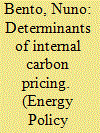

|
|
|
|
|
| Summary/Abstract |
Action against climate change is urgent and requires the participation of firms. The progressive internalization of carbon costs by firms is essential in the transition to a low-carbon economy. Internal carbon pricing is an emerging set of practices voluntarily adopted by companies to embed climate footprint in operations and business models. We explore the factors that explain the adoption of internal carbon prices (ICP) among global companies reporting to the Carbon Disclosure Project between 2015 and 2017. We specifically test whether the macroeconomic, regulatory, industry, and firm-specific characteristics affect the disclosed level of the ICPs. Results show that the ICPs depend to a large extent on the national climate policy, country's development, industry, and corporate governance. Furthermore, context explain more the differences in ICP than industry and firm-specific characteristics. Thus uncertainties around countries' climate policy hampers carbon pricing in business. These findings shed light on the factors that contribute to the dissemination of carbon pricing in society.
|
|
|
|
|
|
|
|
|
|
|
|
|
|
|
|
| 3 |
ID:
085712
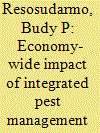

|
|
|
|
|
| Summary/Abstract |
The excessive use of pesticides to control pests in Indonesia during the 1970s and 1980s caused serious environmental and human health problems. To overcome these environmental problems, from 1989 till 1999 the Indonesian Government actively adopted a strategy of integrated pest management (IPM). The general objective of this research is to analyse the impact of the IPM programme on Indonesian economy and household incomes for different socioeconomic groups.
|
|
|
|
|
|
|
|
|
|
|
|
|
|
|
|
| 4 |
ID:
049839
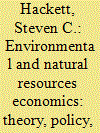

|
|
|
|
|
| Publication |
London, M.E. Sharpe, 1998.
|
| Description |
xxi, 327p.
|
| Standard Number |
0765601095
|
|
|
|
|
|
|
|
|
|
|
|
Copies: C:1/I:0,R:0,Q:0
Circulation
| Accession# | Call# | Current Location | Status | Policy | Location |
| 040284 | 333.7/HAC 040284 | Main | On Shelf | General | |
|
|
|
|
| 5 |
ID:
051070
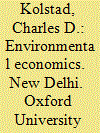

|
|
|
|
|
| Publication |
New Delhi, Oxford University Press, 2000.
|
| Description |
xi, 400p.
|
| Standard Number |
0195119541
|
|
|
|
|
|
|
|
|
|
|
|
Copies: C:1/I:0,R:0,Q:0
Circulation
| Accession# | Call# | Current Location | Status | Policy | Location |
| 048005 | 333.7/KOL 048005 | Main | On Shelf | General | |
|
|
|
|
| 6 |
ID:
124704


|
|
|
|
|
| Publication |
2013.
|
| Summary/Abstract |
This paper fills a gap in the macroeconomic literature on renewable sources of energy. It offers a definition of green investment and analyzes the trends and determinants of this investment over the last decade for 35 advanced and emerging countries. We use a new multi-country historical dataset and find that green investment has become a key driver of the energy sector and that its rapid growth is now mostly driven by China. Our econometric results suggest that green investment is boosted by economic growth, a sound financial system conducive to low interest rates, and high fuel prices. We also find that some policy interventions, such as the introduction of carbon pricing schemes or "feed-in-tariffs," which require use of "green" energy, have a positive and significant impact on green investment. Other interventions, such as biofuel support, do not appear to be associated with higher green investment.
|
|
|
|
|
|
|
|
|
|
|
|
|
|
|
|
| 7 |
ID:
076295


|
|
|
| 8 |
ID:
169354
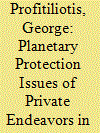

|
|
|
|
|
| Summary/Abstract |
Owing to recent changes in the structure of the aerospace sector and its relationship to government, the landscape of the space industry is now experiencing the emergence of a commercialization paradigm. Private space endeavors may soon be able to target the novel market segments of space research and exploration, space resources utilization, and human access to space and to further stimulate the growth of a new space economy. Thus, the interdisciplinary field of planetary protection has to keep abreast of these advances to avoid unnecessary complications that might hinder the useful reinvigoration of economic interest in the space sector. Planetary protection is defined as a set of guidelines that aim to prevent the forward contamination of celestial bodies with biological material from Earth and the backward contamination of the terrestrial biosphere with extraterrestrial biological material. The possession of the technical capabilities for access to space by more than one private entity is now formulating the public perception of a so-called “Mars Race” that raises significant questions with respect to potential forward and backward contamination issues. This work outlines an environmental economics approach to backward contamination. Specifically, the commercial activities on Mars that may pose backward contamination risks are those that require the return of people, material, vehicles, or other equipment back to Earth, such as the potential business cases of Mars tourism and commercial sample return. Although these activities do not seem to pose a realistic planetary protection risk at present, it would be prudent to consider them during policy-making. Earth-return missions from Mars are expected to generate vigorous public interest worldwide in the environmental, health, and safety risks related to a potential backward contamination incident. As these kinds of missions also involve a post-reentry phase on Earth for the recovery, transfer, reception, and distribution of the samples and for the handling of returned people and equipment, quarantine issues that have not been raised since the Apollo era may become relevant again. In the case of this kind of post-reentry commercial activities, various jurisdictions and laws pertain to the matter. However, public perception will play a key role, as it has done in other industrial development projects with a need for social responsibility. Drawing from terrestrial analogies of siting noxious facilities and other development cases with strong environmental justice characteristics, this work will explore the application of environmental economics as an approach to equitably balance the benefits and costs of future commercial space endeavors with a backward contamination risk.
|
|
|
|
|
|
|
|
|
|
|
|
|
|
|
|
| 9 |
ID:
120942
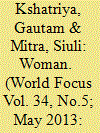

|
|
|
|
|
|
|
|